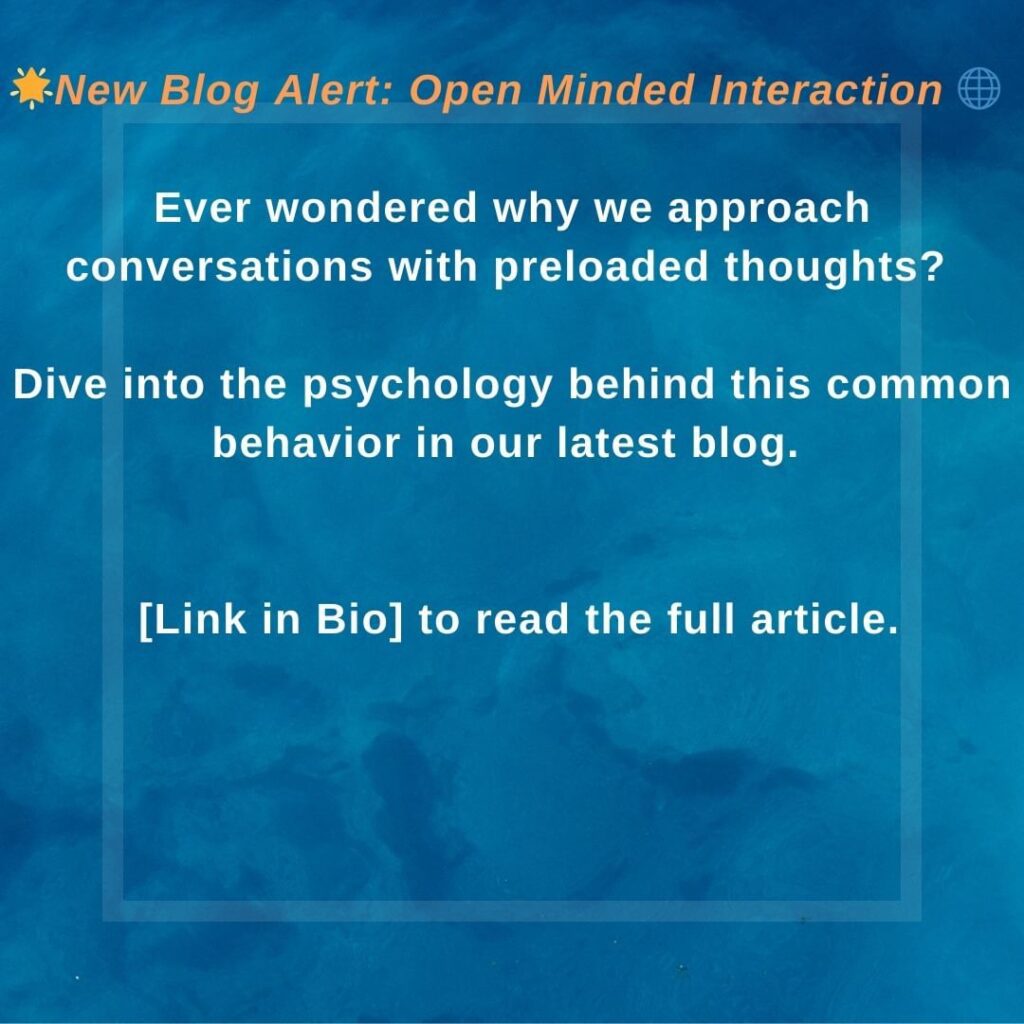– Unlocking the Human Psyche
Explore the intricacies of human interaction in our latest blog, “Unloading the Baggage: The Phenomenon of Preloaded Thought.” Delve into the psychology behind the tendency to engage with preloaded thought, questioning why individuals don’t approach each conversation as a new beginning. Discover the transformative potential of shedding preconceived notions and embracing the unknown for more authentic and meaningful connections.
The Psychology of Preloaded Thoughts in Human Interaction
In the intricate dance of human interaction, a curious phenomenon often emerges — the tendency to engage in conversations with preloaded thought. This blog aims to unravel the intricacies of this mentality, questioning why individuals don’t approach each interaction as a new beginning. Let’s explore the psychology behind preloaded thought and the potential for transformative change when we embrace the concept of a fresh start.
1. The Comfort of Familiarity:
Humans are creatures of habit, finding comfort in the familiar. Preloaded thoughts offer a sense of security, as individuals draw upon past experiences and preconceived notions to navigate the complexities of social interaction. The challenge lies in breaking free from the safety net of what is known and embracing the uncertainty of new beginnings.
2. Cognitive Efficiency:
Our brains are wired for efficiency, often relying on mental shortcuts to process information quickly. Preloaded thoughts act as cognitive shortcuts, allowing individuals to navigate conversations without the need for constant reevaluation. However, this efficiency can inadvertently hinder genuine connection and understanding.
3. Fear of the Unknown:
The fear of the unknown is a powerful force that influences human behavior. Engaging in conversations with preloaded thoughts serves as a defense mechanism, shielding individuals from the potential discomfort of unfamiliar territory. Breaking free from this fear requires a conscious effort to approach each interaction with an open mind.
4. Societal Conditioning:
Societal norms and expectations play a significant role in shaping the way people engage in conversations. From childhood, individuals are conditioned to adhere to social scripts, reinforcing preloaded thoughts as the norm. Challenging this conditioning involves recognizing the limitations it imposes and consciously choosing a different approach.
5. The Power of Mindful Interaction:
Mindfulness invites individuals to engage with the present moment without the burden of preloaded thoughts. Embracing a mentality of a new beginning involves cultivating awareness and actively listening to the nuances of each conversation. This shift in mindset opens the door to deeper connections and genuine understanding.
6. The Transformational Potential:
Approaching conversations as new beginnings holds transformative potential. It allows for personal growth, expanded perspectives, and the discovery of shared humanity. By unloading the baggage of preloaded thoughts, individuals can create a space for authentic connection, fostering a more empathetic and harmonious social environment.
For further insights into human interaction dynamics, explore the related article on dealing with proud individuals: Dynamics of Dealing with Proud Individuals.
Conclusion:
In the grand tapestry of human interaction, the phenomenon of preloaded thoughts is both a product of evolution and a societal construct. While the comfort of familiarity is understandable, the true magic lies in the ability to approach each conversation with the freshness of a new beginning. By shedding preconceived notions and embracing the unknown, individuals unlock the door to transformative change, forging connections that transcend the limitations of preloaded thinking.
Do Follow for More Tips and Inspiration:
- Instagram: Follow us on Instagram
- Pinterest: Follow our Pinterest profile
FAQs
- What are preloaded thoughts in human interaction?
- How do preloaded thoughts influence social interactions?
- Why do individuals tend to engage in conversations with preloaded thoughts?
- What role does familiarity play in the prevalence of preloaded thoughts?
- How do preloaded thoughts affect genuine connection and understanding?
- Can mindfulness help individuals overcome preloaded thoughts in conversations?
- How can societal conditioning impact the tendency to rely on preloaded thoughts?
- What are the potential benefits of approaching conversations as new beginnings?
- How can individuals break free from the fear of the unknown in conversations?
- What strategies can be used to cultivate mindful interaction and reduce reliance on preloaded thoughts?
